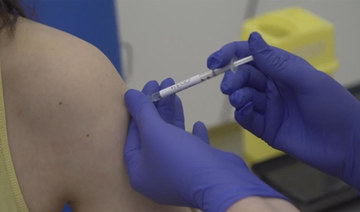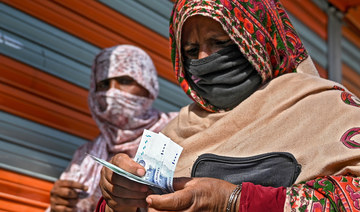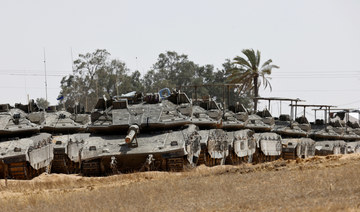MADRID: Spain will have vaccinated a large part of its population of 47 million against the coronavirus by mid-2021, Prime Minister Pedro Sanchez announced on Friday.
He said the government had put together “a comprehensive vaccination plan” that would be presented at Tuesday’s Cabinet meeting, making Spain the first within the EU, alongside Germany, to fully map out such an immunization scheme.
“We are ready,” Sanchez said, indicating the government had been working on the plan since September.
“Our forecasts, under almost any reasonable scenario, show that a very substantial part of the Spanish population will be able to be vaccinated, with all guarantees, within the first half of the year.”
The move, he said, would make Spain “the first country within the EU, along with Germany, to have a full vaccination plan.”
Spain has been badly hit by the pandemic, suffering more than 1.5 million confirmed infections — the EU’s second-highest number of cases after France.
As of Thursday night, it had also lost 42,291 lives to the virus, ranking fourth within the bloc after the United Kingdom, Italy and France.
Last month, Health Minister Salvador Illa said the government had authorized the purchase of 31.5 million doses of a COVID-19 vaccine currently being developed by British pharmaceutical giant AstraZeneca.
The supply of the vaccine is part of an EU scheme and it could start reaching Spain in December “if there are no delays,” he said at the time.
Major pharmaceutical companies are now closing in on vaccines against the virus which has infected more than 55 million people and caused more than 1.3 million deaths worldwide, according to an AFP tally.
US giant Pfizer and its German partner BioNTech have taken the lead in the global chase for a vaccine alongside US firm Moderna, with the EU saying it was hoping to have both products approved for use by the year’s end.
The European Medicines Agency could give “conditional marketing authorizations ... as early as the second half of December if all proceeds now without any problem,” EU Commission president Ursula von der Leyen said.
The EU has contracts to reserve hundreds of millions of doses of future vaccines with BioNTech, Purevac, AstraZeneca and Sanofi if they can be brought to market.
A candidate vaccine being developed by the University of Oxford and AstraZeneca has also been shown to be safe and effective in a smaller study of older adults.
Earlier this week, Spain’s AEMPS medicines agency approved the country’s first phase three trial for a COVID-19 vaccine, one of nine nations to take part in the process.
‘Substantial’ part of Spanish population to be vaccinated in first half of 2021, PM says
https://arab.news/8espc
‘Substantial’ part of Spanish population to be vaccinated in first half of 2021, PM says
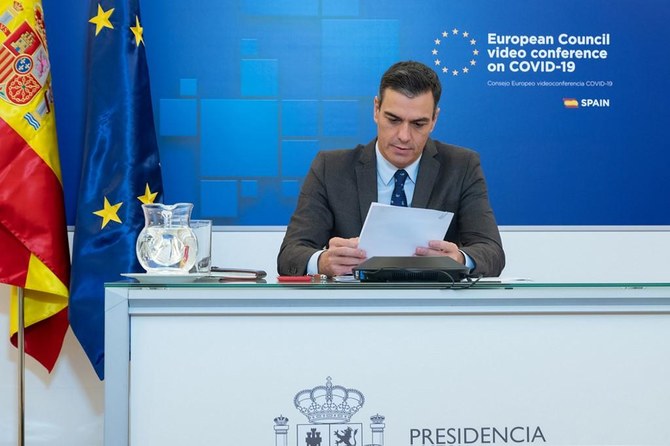
- The supply of the vaccine is part of an EU scheme and it could start reaching Spain in December “if there are no delays,” he said at the time
Indian PM Modi says he does not oppose Islam, Muslims as election campaign heats up
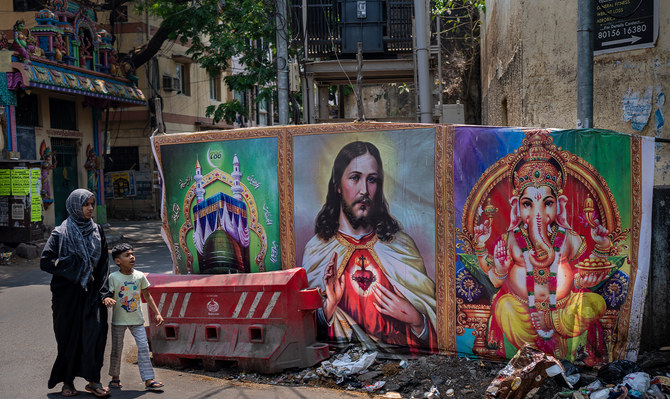
- Modi’s critics accuse him and his party of targeting India’s minority Muslims for electoral gains
- Allegations grew after Modi referred to Muslims recently as “infiltrators” who have “more children”
NEW DELHI: Indian Prime Minister Narendra Modi has said he does not oppose Islam or Muslims and wants the community to think about their future growth as they vote in an ongoing general election that completes its third phase on Tuesday.
Modi’s critics accuse him and his party of targeting minority Muslims for electoral gains and the allegations grew after Modi referred to Muslims in a recent speech as “infiltrators” who have “more children.”
He denied discriminating against Muslims and has linked his recent comment to what he described as the opposition Congress party’s election plan to redistribute the wealth of majority Hindus among Muslims. The Congress denies making any such promise.
“We are not opposed to Islam and Muslims,” Modi told broadcaster Times Now in an interview aired on Monday. “The opposition is looking after its own benefit. Muslim community is intelligent... the opposition is worried that their lies have been caught.”
Modi is seeking a rare third straight term in the seven-phase election that started on April 19 and ends on June 1. Eleven states and territories will vote in the third phase on Tuesday and surveys suggest Modi will win comfortably when results are declared on June 4.
His campaign began by showcasing economic achievements of the past 10 years but changed tack after the first phase of voting and focused more on firing up his Bharatiya Janata Party’s Hindu base by attacking rivals as pro-Muslim.
“I want to say to the Muslim community: introspect, think. The country’s progressing, if you feel any shortcomings in your community, what is the reason behind it? Why didn’t you get government benefits in the time when Congress was in power?“
Analysts say Modi and his Hindu nationalist party have made controversial remarks to invigorate their hard-line base as the election sees comparatively low voter turnout from previous years. Surveys say jobs and inflation are the main concerns of voters.
“Think of your children and your own future,” Modi said, referring to Muslims and the elections. “I don’t want any community to live like laborers because someone is scaring them.”
PM Modi votes as India’s marathon election heats up

- Modi’s ruling Bharatiya Janata Party is expected to win India’s election convincingly
- Indian PM has stepped up rhetoric on India’s main religious divide in bid to rally voters
AHMEDABAD, India: Hindu nationalist Prime Minister Narendra Modi cast his ballot Tuesday in India’s ongoing general election after giving several inflammatory campaign speeches accused of targeting minority Muslims.
Turnout so far has dropped significantly compared with the last national poll in 2019, with analysts blaming widespread expectations that Modi will easily win a third term and hotter-than-average temperatures heading into the summer.
Modi walked out of a polling booth early morning in the city of Ahmedabad while holding up a finger marked with indelible ink, flanked by security personnel and cheered by supporters.
“Voted in the 2024 Lok Sabha elections,” Modi said on social media platform X, referring to India’s lower house of parliament.
“Urging everyone to do so as well and strengthen our democracy.”
The premier’s ruling Bharatiya Janata Party (BJP) is expected to win the election convincingly, but since the vote began on April 19, Modi has stepped up his rhetoric on India’s main religious divide in a bid to rally voters.
He has used public speeches to refer to Muslims as “infiltrators” and “those who have more children,” prompting condemnation from opposition politicians, who have complained to election authorities.
Modi has also accused Congress, the main party in the disparate opposition alliance competing against him, of planning to reallocate the nation’s wealth to Muslim households.
“This is the first time in a long time that he is so direct,” said Hartosh Singh Bal, executive editor at news magazine The Caravan.
“I haven’t seen him be this directly bigoted, usually he alludes to bigotry,” he added.
“The comments on wealth redistribution are targeting something from the Congress manifesto that just does not exist and that is frankly quite unfortunate.”
Modi remains widely popular a decade after coming to power, in large part due to his government’s positioning the nation’s majority faith at the center of its politics, despite India’s officially secular constitution.
In January, the prime minister presided over the inauguration of a grand temple to the deity Ram, built on the site of a centuries-old mosque razed by Hindu zealots decades earlier.
Construction of the temple fulfilled a long-standing demand of Hindu activists and was widely celebrated across India, with extensive television coverage and street parties.
Modi’s brand of Hindu-nationalist politics has in turn made India’s 220-million-plus Muslim population increasingly anxious about their future in the country.
The election commission has not sanctioned Modi for his remarks despite its code of conduct prohibiting campaigning on “communal feelings” such as religion.
India’s election is conducted in seven phases over six weeks to ease the immense logistical burden of staging the democratic exercise in the world’s most populous country.
Much of southern Asia was hit by a heatwave last week that saw several constituencies vote in searing temperatures.
In the city of Mathura, not far from the Taj Mahal, temperatures crossed 41 degrees Celsius (106 degrees Fahrenheit) on polling day, and election commission figures showed turnout dropping nearly nine points to 52 percent from five years earlier.
An analysis of turnout data published by The Hindu newspaper concluded it was too early to determine whether hot weather was impacting voter participation.
But India’s weather bureau has forecast more heatwave spells to come in May and the election commission formed a taskforce last month to review the impact of heat and humidity before each round of voting.
High temperatures were forecast for several locations voting on Tuesday including the states of Madhya Pradesh and Bihar.
Years of scientific research have found climate change is causing heatwaves to become longer, more frequent and more intense.
More than 968 million people are eligible to vote in the Indian election, with the final round of polling on June 1 and results expected three days later.
Ground invasion of Rafah would be ‘intolerable,’ UN chief warns

- Israel has killed more than 34,700 Palestinians, around two-thirds of them children and women, according to Gaza health officials
UNITED NATIONS, United States: A ground invasion of Rafah would be “intolerable,” UN Secretary-General Antonio Guterres said Monday, calling on Israel and Hamas “to go an extra mile” to reach a ceasefire deal.
“This is an opportunity that cannot be missed, and a ground invasion in Rafah would be intolerable because of its devastating humanitarian consequences, and because of its destabilizing impact in the region,” Guterres said as he received Italian President Sergio Mattarella.
UK military personnel’s data accessed in hack, BBC reports

- MPs could be informed about the development in the Commons on Tuesday
Some personal information in a payroll system used by Britain’s defense department has been accessed in a data breach, the BBC reported on Monday.
The system was managed by an external contractor and no operational Ministry of Defense data was obtained, the broadcaster said, adding that the department took the system off-line immediately.
Information like names and bank details of current and some former members of the Royal Navy, Army and Air Force was compromised, according to the report.
The Ministry of Defense did not immediately respond to a Reuters’ request for comment outside working hours.
MPs could be informed about the development in the Commons on Tuesday, the report added.
Russia says it takes control of two more settlements in eastern Ukraine
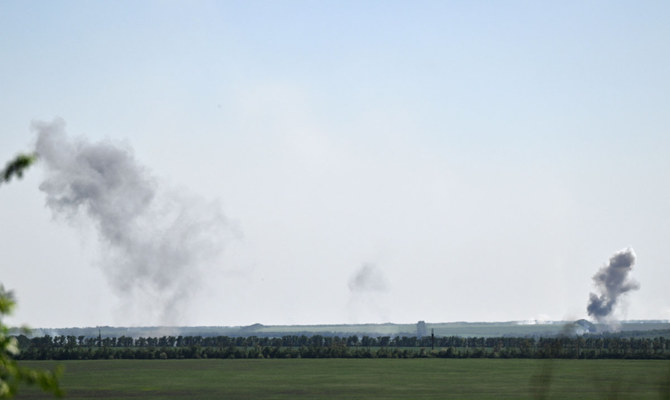
- Russia has made slow but steady advances since taking Avdiivka in February, with a string of villages in the area falling to Moscow’s forces
MOSCOW: Russian forces have taken control of the settlements of Soloviove in Ukraine’s eastern Donetsk region and Kotliarivka further north in the Kharkiv region, the defense ministry said on Monday.
Ukraine’s military made no mention of either locality in its evening General Staff report. Kharkiv Regional Governor Oleh Syniehubov said on Monday that Kotliarivka, located near the town of Kupiansk, was one of several locations to come under Russian shelling.
But Ukrainian bloggers appeared to acknowledge that both villages were in Russian hands.
DeepState, a popular forum on the war, noted on Saturday that Kotliarivka had been captured by Russian forces and on Sunday said the neighboring village of Kyslivka was also in Russian hands.
DeepState reported that Soloviove, northwest of the Russian-held town of Avdiivka, had been taken by Russian forces last week.
Russia has made slow but steady advances since taking Avdiivka in February, with a string of villages in the area falling to Moscow’s forces.



